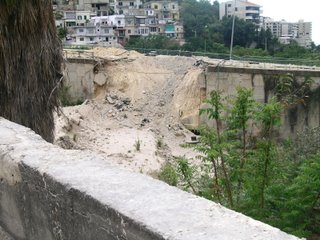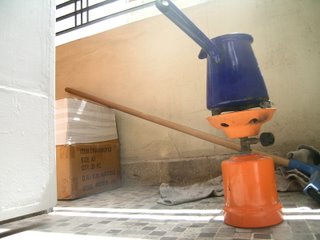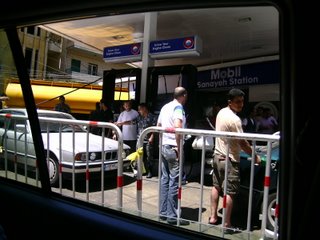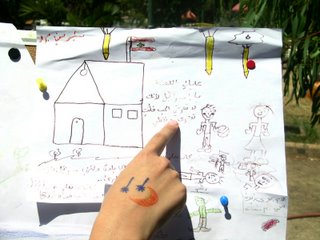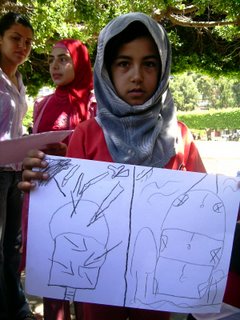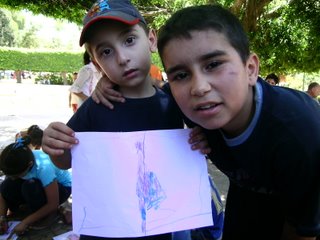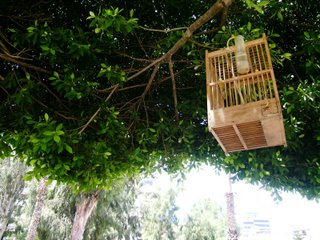Today, I finished rwf.blogspot.com. This, the final post, is built on a collection of notes from the past ten days. Thanks to all who have read - and good luck. T

I: HOSPITAL
You are sitting in the American University - Beirut Medical Center. In the lobby. It's visiting hours.
In the past few days, you have dutifully gone about your work at the SDC as the immediate threat of bombs has all but dissipated from the collective consciousness of the people around you. Alongside Selim, you have finished a sound proposal for funding that he will be circulating. Already, there is a rumor of a contribution from a local embassy, from some French contacts. You reserve comment, hoping somewhere there is an American philanthropist that will do you personally proud.
The SDC has switched gears. Selim has worked with uncanny speed to transition to the second phase of his plan to build peace culture and solidarity among the affected and non-affected youth of Lebanon. Although you occasionally broach the conversation with Selim or others (volunteers, shopkeepers, cab drivers), the war belongs only to the diplomats, to the UN, to the media. Other than the infrequent metaphorical glance to the southern horizon it is business as usual, it is time for rest, to mull reconstruction. At least in Beirut.
This weekend, having prepped, planned, gathered, and trained a small army of volunteers and enrolled hundreds of young participants, Selim and the SDC will launch the first of two years' of weekend retreats and camps. Children will come from all over, from all different confessions and political ideologies lured by the fun of the camps; there, they will share stories, and will actually start to determine what their role is in designing the future of their country. Together, they will laugh and train and plan. Selim will offer them the opportunity to work collaboratively on projects - building kites, making food, pitching tents - and will quietly inform them of their rights and opportunities as 'a citizen'. But he will leave the choice to them.
Selim (to me): "You know, we are not just having them build a trash bin. We build the trash bin and we say, 'OK, now you have a rubbish bin - if you use it, if you put your trash in it, you don't get sick. If you don't, you get (scratches his arm to indicate a rash).' And then we let them choose. If they choose it, we say, 'OK, it is your right to have one - and if you don't have one, it is your duty to ask for one."
The retreat series this weekend kicks off with 200 kids (organized in less than a week); the SDC will run the program series for two years, train hundreds of volunteers, host 100,000 participants if all goes according to plan. If your proposal strikes a chord.
Although you take a massive amount of pride in having come to Beirut, in having assisted in the propogation of sound, simple, and extraodinary methodologies for peace (and sanity) building, in having put faith in your own ability to carry through on your principles and come out ahead and unscathed (against controversy), you are struggling now with the looming questions that came out of the dark at the moment of cease-fire. a) What is the worth and impact of your accomplishment? b) When and how will you know when it will be your time to leave this? c1) What is the composition of society at large such that it allows (even plans?) for such conflict and bloodshed?c2) What can you do and what tool can you create to focus those bloodthirsty elements of the human condition towards the active pursuit of peace, justice and prosperity?
You are hesitant to accept what people have been telling you, their "advice" to you when you share with them your mission of building new channels to focus energy into cooperative construction. You have been told that people are bad...that there is no hope. Are you unable to believe this because it sounds too simplistic? (on the boat from Cyprus to Beirut, you can still hear Tucker Carlson giving you advice after he heard of your trip into the warzone, telling you that he admired those that ran towards the sound of gunfire, but that you would be doing it a lot in the future if you kept it up, that it would benefit you to acknowledge the existence of real evil in the world. You shuddered then to recall that this idea was the foundation of Sean Hannity's diatribes and, frustratingly, of the strength of his convictions - or so you thought or think.)
Or, you do not know if you simply choose not to believe this because it is inconsistent with your own upbringing. You have been labeled many times (with a sneer) an "idealist", a Liberal, a progressive...still, you realize that your supreme faith in the good nature of man might (ironically) be the one vestigal thought that remains from your Catholic upbringing. Even after years of conciously trying to disabuse yourself of all dogmatic claims in the effort of piecing together your own understanding of human beings by your own processes and data, you realize that you have been holding on to one memory: a conversation you had as a child with your Jesuit uncle where he explained to you that people were good, that it was tempation by evil that led the good astray.
Sitting in the lobby, you are cursing yourself. You have believed your choices and your plans to be based on a larger pragmatism. But should it be true that underneath you clutch nothing more than a frail and childish 'hope', you have committed the same 'crime' that you have accused the neocons (from the US to Iran) of perpetrating: decisions and action based on what they would like to see rather than what the reality of the situation demands.
You are sick. You are anxious to bleed the 'idealism' from your system. Sitting in the hospital lobby, you are sure that your uncle had been simplifying the matter for your young ears. He continues to be an intelligent and cutting thinker. You wish to go back to that conversation and force him to address the Church's idea of original sin. Is baptism, then, just a way of getting people to the church? A way of hooking themin, just as you get the camera only after enduring an exhaustive tour of time-share condos while salespeople cajole you into making a substantial investment?
Visiting hours are well patronized. You are at once a) aggravated that the architect chose to design a lobby that seems an all too patronizing image of the gateway to heaven and b) immediately touched by the delicate and potent humanity you see play out in the gestures and faces of people as they pass. A group of elderly people - two couples - leave the visitation center, the women walking in front of the men in twos. There is gentle laughter, an air of relief among them - "They are going to be all right". There is quiet after they leave. Then, a family of five departs the inner hospital and parades humbly through the waiting area; three teenagers walk silently intent on the exit door, a husband lets them lead and occupies the empty space - some 15 meters - between them and the mother, who is lagging, who is averting her eyes, who is searching for a tissue now in her large bag to stop the tears barely willed back. A young mother erupts into the waiting area having completed her checkup; she playfully runs to her little son who has, to her joy, waited patiently in the same spot where she left him. There is a shower of funny kisses with he takes pains to wipe at quickly as the embarrassment stings his cheeks.

To your right, you find a grandaughter and grandmother waiting side by side in silence. The child bounces her feet over the edge of the chair while the woman watches the doors to the interior of the hospital, where patients and visitors alike disappear, from which visitors only emerge. You think that they look alike; you see a line between them, sixty years of life time experience occupying the inches between their heads. You think about what it would take to make sure that when she's sixty that the little girl doesn't look just as exhausted as her grandmother does.
You wonder about getting up. This is your last official errand for the SDC. You have accompanied SDCCurlyRedHairVolunteer to the hospital so that SDCCRHV can have a meeting with one of the staff here. The SDC is producing a hygiene manual for children enduring tough conditions as their homes are being rebuilt. You have been told to wait as the meeting will last only 15 minutes. Over an hour has passed.
You take to the chair, only glancing up occasionally at the doctors and nurses emerging onto the balcony above the waiting area, silently and with straight faces and white coats watching the parade of people come in and out. The images of Qana roll through your mind as do the visions of destroyed bridges, the smoke rising from the port, the old man screaming in his bed, the filthy stickiness of the Beirut shelters, the overwhelming anger at how quietly this challenging and destructive failure of 'the system' and individuals seems to be slipping away, attention redirected to Iran or whatever new conflict currently brewing in the minds of the powers that be. Selim is convinced Israel will take the Bekaa Valley next, where Hizbullah is still strong and the International presence will be weak. By fear or by plan. And regardless, what has changed? There will be another conflict soon, there will be more dead given only a number to mark their graves. Some of them will be children. You are hit quickly with two successive impulses: 1) to rush into the hospital, to sit and chat and invest a comforting interest in the lives of those patients that have no one to visit them; 2) to shut up your stupid idealistic mind - who are you to do that job? You are certain that one of the patients would be upset with you for not being the rounds nurse that he has been expecting for over an hour with his pudding cup. Where is my pudding? Where is my pudding, dammit?
The doors to the interior hospital make a "whooshflpt" noise as they open and close.
II. INTERNATIONAL CAST OF CHARACTERS.
There has been an cast of international characters: Iran, Israel, the US, Syria, Lebanon, the UN, the "International Community" (which you realize means 'Europe'), the Arab League, etc.
You are familiar with them like people; the country of Iran, the United States doppleganger. Similar in its conservative nature, in its political posturing, in its constant claiming of the moral high ground, in it subversive political maneuvering and coup staging...not just Hizbullah here but purported to be funding the civil war in Iraq to violence in Africa in the name of Islam. Almost parallel levels of hypocrisy from both administrations. You have learned from your Iranian friends that the rural areas go conservative while Tehran goes progressive. Different in that it uses words well, and effectively. Selim says that Iran is attempting to unify the entire Arab world under its call - from Pakistan to Lebanon. Different in that it has a massive human rights problem, in that it stifles its press (better) and that unlike the US, its progressive movement (by virtue of intelligence or circumstance) quietly stand in patience while US Democrats flounder in spite of what's been handed to them.
Syria, 'the little country that could': ruled by the son of a powerful man that died with the hope of re-securing the Golan Heights, of dipping his toes in the water; the ruling son is now under internal as well as external scrutiny - he is part of a minority group clinging to control of the country. His father's aides, questioning his ability to maintain control, seem to circle him like sharks. Syria, playing both sides against the middle in a desperate attempt to reassert itself as real power in the region; making deals with Iran and Hizbullah, denying International troops on its borders while begging the United States and International Community to be allowed at the peace table. Syria... in the corner.
Israel, the lost. After iterations of war-dependent leaders, a truly decisive blow to reliance on military force: policy has driven its thinking and its population into check. They are stuck. Now would be the time to begin talking if they could; they've caused too much damage and have lost too much credibility to even conceive of going to the table. They will have to continue to find a way to fight. They are in a broken washing machine stuck on the spin cycle.
You think of Lebanon caught in the middle, tired, divided. You were angry with Lebanon, but no longer. After only a few weeks, you realize you too are tired. It is your time to leave. Selim has told you that your greatest asset is that you are an outsider, that it gives you greater clarity. He admonished you for your foolish pursuit of destruction on the last day of the Beirut bombing campaign. You told him in response that you thought it beneficial to your future role as a negotiator to understand the whole people at your table and you still believe that; he acknowledged the sentiment but after losing two uncles in the civil war and pulling himself back from a period of intense rage, he advises you to stick to the sidelines, to mind your role as--at best--a referee. Above all things he says to avoid politics and focus on planning and civil society. He is a bit irritated with your declaration that you will be President of the United States in 25 years, that you have a long term plan to grow your heart and your mind and your skill set, that you will continue to work on a pragmatic plan that will catch the United States up with the rest of the world...to craft a potent long-term and short-term agenda. If you do the math, if you commit to years of training and planning and research and experience and fighting, you think you can tear progressive from its weak "idealistic" label. You can prove an internationalist and humanist policy can be an economically beneficial one. You can make enlightened choices concrete and popular in the minds of the American public. You can be part of the renaissance.
He says he won't give you a dime for your campaign because either a) politics will always be too corrupted and you won't get anything done (which you can't stand because, by God, you're smart and stubborn) or b) you yourself will be corrupted. Politicians are useless. You listen to this and it only fuels you. It's the very reason you plan to do what you're doing to do.
But Lebanon's exhaustion tames that flame. You have realized that you're no longer angry with the Lebanese for not giving you your silly dream of political reconciliation across sectarian lines - at least not the people. In fact, you think that they may have. On your walks to work, you feel the traffic pass, watch people able to live and work without being immediately mindful of 'threat'; on walks home, the clubs 'bump' again and you wade through the people mobbing Gezmayzeh. You like to pretend on these walks that nothing ever happened or--better--that it is the simple love of life demonstrated by the Lebanese that already binds them together in a way that politics never could. The thought is enough for you to consider other commitments for your life in spite of how antagonized you are by political (or any kind, really) weakness, stupidity and corruption. Your brain twists and you keep asking yourself: what do I do to prevent children from being hit by bombs? What's the big idea, here?
You think of the US…you think of the bombastic 12 year old that found his Dad's gun and uses it to lord over the neighborhood. His parents don't ever seem to be coming back...

SECOND TO LAST NIGHT.
You think of all of these things swirling around the one central question: what will it take? What would it take to focus mankind's drive towards elegant progress in all spheres? What will it take to place cooperative action over bloodshed as the only real solution to conflict? You are awake for days, searching your brain, looking at all the systems that have been designed, from self discipline, to the church, to the non-state actor, to the state, to the international community. You are wondering about what simple code of conduct, what preventative mechanisms (such as education) and what system of justice and enforcement unifies each of these and could be demonstrated to unify all people in a way that accounts for human error and weakness. You are in Selim's backyard, unable to sleep for the third day.
It is 2 am when Selim and Baha find you in the back, staring at a candle. Again, there is not electricity.
Selim (to me): 'Thomas, what...what are you doing?'
Me: ...I...am...trying to figure something out...I am trying to figure out what I have learned.
Baha is the grease to the wheel, the older brother to the young volunteer staff at the SDC; he sweats humor and humanity; he's just hysterical. He's aware that he speaks only broken English and uses it to his advantage in making you laugh.
You mean to say: I am trying to pin down what I have learned here before I leave, before the subject matter is taken off the table. It has to be now, because when I try to figure it out later the integrity of what I have witnessed and felt will undoubtedly be corrupted by time and distraction. It is difficult for you to voice this without sounding....like an idiot. Outloud.
Baha: "Thomas, Thomas...I was going to make ...a joke? but I will tell you (he talks with his hand waving as both sit at the table with you around the candle) – seriously – only you can answer this question."
Selim: Baha, you know, he speaks the truth. So you tell us, you tell us what you have learned.
You think and try to visualize. Me: I have learned that …there is the feeling that humanity is driving a car. Very fast. But instead of looking forward to decide when to turn or to stop, humanity is driving forward while looking in the rearview mirror. That's how it feels.
Baha has a degree in Political Science, has heart, has teeth for conversation - he has an emphatic way of talking that demands both your intellectual respect and pulls your heart at once. He answers this image as if he'd been waiting to tell someone what he held for too long; he erupts.
Baha: Yes, but...in America, what is in the mirror!? When you look back there is only space...there is...there are question marks? You do not have the history. You had a civilization, but it is gone. You took it, you... You have a history but this history is not like the way that they teach it to you. You have a history that is built on lies; this...the first colony?
Me: Jamestown
Baha: ...it was a colony of prisoners!
Me: looking for gold.
Baha: Here we have had the Greeks, we have had the Romans, Ottomans, the Arabs, the French the British…
You remember that instead of taking a Guidebook with you to the Middle East all you took was a $4 Rand McNalley historical atlas of the world. In recent days you have been flipping through it, watching the area of Lebanon change color at almost every page, dominated by some new force...early in the book, the city of Tyre appears - on par with Carthage as one of the largest cities in the world 1000 BC. It's been leveled as of last month.
Baha: But ...and the history you have? You do not look to your history because you do not know it - only we see your history. Bush, Rice...they are saying that this is a new ...ah...it's a new...
Me: experiment
Baha: it is the same, it is the same that happens with us again and again. This is the same experiment – it is the same as 1950s, as 70s, as 80s as 90s... it is the same again and again!
We go through all of of Middle East modern history. The creation of Israel, the series of conflicts, the US buying off Egypt to secure peace, the US funding both sides of the Iran/Iraq war which killed hundreds of thousands (IranGate under Reagan); we touch back on other issues. They raise the argument that the US Civil War has more to do with economic interests than anything as noble as the rights of the human being, talk about Native Americans, the Louisiana purchase, contras, Bin Laden (funded until even '96 by the CIA under Clinton)... you talk about 9/11, you talk about Pearl Harbor, you talk about the military-industrial complex. You see your country as having fallen down a very, very slippery slope.
The themes of economic interests and ideological interests and military posturing as intertwined appears...
Selim: You know, we kick Baha around and we call him a jackass for fun but you know he is speaking the truth. The United States, you like to let us grow big big big so you can cut us down, so you can claim a victory. You like to keep us broken up...
You all agree that this is a problem, a course of action that has failed...and you sit and watch the others still trying to figure out how to transition to a more forward-thinking foreign policy. How to cement in the mind of the average American the idea that neighborliness is actually strength? That supporting economic development of all regions is the only way to lay the cornerstone to peace ("you know, people will fight when they are hungry")? To inspire a new level of competition in American companies that will reform our education system in a way that promotes truly innovative, capable and creative minds. You ask them what should be done.
Baha: You must...you should play the.. broker.
Me: The 'honest broker'.
Baha: Yes.
Selim: No no no, it's not gonna work. You can't, the United States can't do that anymore. You already have declared your stake. With this, you know, this changes things. You have to look at that stake first.
Me: Well, if I were president what would you tell me to do? You're my political advisor...
Selim: You have to figure out...what is the deal that the United States has with the Arabs?
He's right. We have no real foreign policy, no system in place, ad hoc decisions based on playing favorites...
Selim: To do that you stop funding Israel – no not stop funding - just fund who is right, who does the right thing. Play by rules. You have a stake now. America was built to be a republic, not an empire. You are not set up to do this. And look, look at what happens when you try to go against your own design? Look everywhere...this is just an embarrassment to the United States. This is a real embarrassment. With Clinton he did great things but they didn't take, they were weak and he left office. But still, he understood. With Bush? This guy... ..I know the Syrian Ambassador to the US, I have met him personally. And the Syrian Ambassador, who is a real jerk I don't like this guy, he told me this story. When he first arrived in the United States, he went with his wife to meet with the President. It's a custom to go and meet and introduce. He goes to meet with Bush. And Bush he turns to the ambassador's wife and he says 'so how do you like America?' and his wife says that she is bored, that she wants to find a place to continue her studies; Bush says, oh, what are you studying? Computer engineering. Bush says to her – and I cannot...he says to her: 'they let women study in the middle east? They let them go to college?" this is the most powerful man in the world! This is the man who claims to have a new plan and he does not know a thing about what he is doing!
Baha: "Thomas, Thomas look at me. I want for you to promise that you will do me a favor. Only to your friends, I want you to tell your friends. Tell them we have internet. Tell them we do not – we are not bombing things all the time (mimes bombs strapped to his chest). Tell them that we read books! Please Thomas! Ha ha ha! I am serious, you have to tell them. Tell your friends. Tell someone. Tell them we read books. Tell them these things.
Selim: We have culture here. Thousands of years.
Me: So, why the fighting? Because you would think with culture...you would think with age would come...
Selim: Because along with culture, we do not have a strong economy which means we do not have the best schools. Without good education the people turn to religion as a crutch, which leads to divisions. This is not just the middle east – this is everywhere, this is how people are, you know? And where the religion leads, the people support.
Me: I know the answer to this question - I know what I think, but what do you think of the idea of redrawing the map?
Selim: I really don't mind the idea of the theory, but it's just that it's a stupid idea that will never work. It's never going to work. Democracy it means different things to different people; it's a good idea but it has to come from the people; if it doesn't organically grow from the people over time, it's just not going to take. Anything imposed from the outside just doesn't work. And lots of times it's just a lie: Israel created Hamas to take Arafat out of power, you know? So to tell you what to do as president - ask yourself what your real stake is. Economic development: just be fair. When you start picking and choosing you loose credibility. Democracy can take care of itself from the inside, the system will adapt. There are plenty of progressive movements in the middle east, all good people. When you pick sides, when you damage the name of democracy, these people they lose hope and credibility.
You tell him the idea of eternal vigilance. That you think America is so used to climbing to the top and being the best that you get the feeling that once it achieved the best it just had no idea what to do with itself. It started looking for immediate thrills, a child with a loaded gun. The new kid on the block is a little weird and increasingly unpopular.
Selim: You know, Baha I kick him around and all we make fun of each other and he doesn't have a French education; but still he knows the history of your country much better than you do. You hear what they tell you they do; we see what they do. I went and I gave a lecture to a group of US students studying conflict resolution in the middle east. This was their course of study. Before the class started I drew the outline of the United States and Canada on a map and I erased the borders and things and just drew land and water. And I said, ok here we have a blank map of the middle east – please, students, come and tell me where is Lebanon? Where is Israel? And they started pointing to places on the map! – it was a map of the United States! And I said 'ok that's it, lecture's over'. If you don't know yourself, how can you know about anything else?
Selim: You know Thomas, I want to tell you something. I know that I - and I am being serious here – I know that I am fighting a losing battle.
You: What?
Selim: I know that I am fighting a losing the battle. You will always lose more than you win in what we do. People, it is in their nature to fight with one another.
And this runs contrary to everything you've seen up until that point. You look back on the entire conversation, the conflict, the senselessness, the way your country has acted, you scroll through the Rand McNally atlas in your head. These words from Selim make you want to vomit. You need to believe in solutions. You refused to leave having just 'endured', having just put a band-aid on the deep laceration.
You: People are not evil. They fight because they are looking to secure resources.
Selim: But still, they choose to fight.
It erupts. Selim invokes Hobbes, Locke, Rousseau, realpolitik, the realists, the idea of naturalism.
And he is right, you agree. You agree that that this is not a question of good or evil but that good and evil are value judgements based on the actions people take when they feel their survival is threatened. Still, you defend the nature of man as good before these acts are committed. You persist in saying that fighting was the first solution to limited resources, to threat. But that it is equally a part of human nature to build tools, to build systems, to find solutions. That if you can clearly and unquestionably demonstrate to people the true effects of their actions, that they will choose cooperation - if you can show the revenge cycle, how it comes back around, you can build a market for new tools, for new policy. You just need to teach a different way of cooperating, of diffusing the tension fear and doubt and focus on solving the problems – which can and will be solved. You just need to provide new training in this. You think of all the ideas you've had for governance classes for high schoolers, for philosophy as a requirement for high school. You say it is already happening in minor ways, particularly with environmental issues - data shown makes the threats of global warming take root in the public mind. It takes persistence, it take a novel approach...the only limiting factor, as you see it, is the limited life span of human beings. There is so much to learn - but with a new era of international conflict comes a new opportunity to learn collectively. It can be done, it will just take the right people to do it! It will take an agreed upon vision of the future. You tell about your idea for www.readingwhilefalling.com - an open source wikipedia style interface where instead of telling of history and current events, people actually - by the design of the site, by consensus - design the future of the United States - from education to economy, from interest rates to city planning ordinances... It will take only the creation of vision! A workable goal! A light that we can all aim and work towards instead of being tossed back and forth by events and self-interested politicians!
Selim: You know, you just read realpolitik. It will never work, Thomas. They will fight over the design of the site.
You raise your voice and as you speak Baha leaves the table to the hammock - he has said what you are about to say to Selim before, he has taken the stance of the pragmatic idealist, has argued that people might resort to fighting but with proper alternative outlets - better outlets and better social training - that we, together, can solve this. Baha, as you are about to, has called Selim a hypocrite for this naturalistic stance: You do this. You do this! You stand apart, you stand apart! How can you claim to be losing the battle? How can you tell me my ideas on this don't hold merit!? You act under altruism and cooperation and you work it, you make it work. You are changing things in this very manner! You are tapping into the cooperative elements of human nature!
You have seen it with your own eyes. You have seen the rubbish bins.
Selim is quiet for just a second, thumbing the table.
For weeks you have seen eye-to-eye on policy, on politics, on methods of training and fundraising, on language for the SDC literature. You appreciate the same canonical texts and you both hold them close. But you are suddenly touched by his urging to 'stay out of it'; you start to understand that after all of the talk of outside factors, of history, of everything that has swirled about you, that most of this had been talk - just talk, by design. With passion, with intensity, granted. But it has been dinner conversation, not your training. You think of how serious his face got when he told you about how disappointed he was that you had taken off to see destruction, to see pain. And how he followed it up with his own personal story of loss, about how it got him nowhere.
You realize that he is so good at his job - so good at showing people a way beyond fighting - because he has been forced to put himself through it. You see him still struggle for a moment to find his footing; you realize that being good at being good means understanding the mindset of the 'bad', and that to be really good, you have to really understand the bad, keep it with you...and you see this as a burden, this idea of constantly having to vie against such a formidable foe as what has been called "human nature".
He is protecting you. You see a complicated man, whose mind and heart are pulled in two directions by personal history and intelligent hope. He is attempting to spare you some pain, you think. And you feel young and looking at him, your stomach is torn up by the first real understanding of all that will be sucked out of you if and when you attempt to implement your progressive ideas into the public mindset, guerullous and unforgiving. You see, just for a second, the absolute weight that he holds, you think of the face of the old woman, you think of your own face tired after only a few years of grassroots work. You are furious.
And Selim, as always, returns to calm, to light.
Selim: Because, what else am I gonna do, you know? I believe I am losing the battle. But I will tell you this one thing and then I will go to sleep. (He rises from the table; it is past three; Baha has passed out in the hammock). Let me tell you, as long as there is one person left that is willing to practice being a citizen and wants to do it and they have a heart that is beating in their chest, I will give it everything I've got.
You stay up until dawn, plotting the next twenty-five years of your life.

LAST DAY:
On your last day in the office, you pull out old Lebanese bills - currency from 20 years ago - and show them to the staff. A cab driver pushed them on you as a gift - you're still not sure why.
The proposals are complete, the literature is written, the camps are set to start in a day or two. The shop is tidy as far as you're concerned and if and when grant money comes you'll return. Selim has offered you a post under the prerequisite that you learn Arabic. Well. Until then, it'll be school in ethics and then development/econ/sociology and law. At least four more years of school.
Before that, it'll be a planeflight home to see your mother. You show SDCCurlyHair volunteer the old bills and she tells you the story of the day that as a child she was yelled at by a shopkeeper for trying to use them to buy chocolate, the day they had gone out of use. She asks you if you like Beirut and you struggle to find an answer that doesn't involve the word 'war'. She tells you have not had a social life and so you have not learned a thing about the Lebanese. She says you have to see the rocks at Rouche. You leave the office together; one last time you wander the city. You visit the coffee shop and inquire about Khawlah. She is gone. Not coming back, says the girl behind the counter. Still, you are pleased to find a gentle crowd in Nejmeh - more people than you've seen in weeks.
Together, you go to Rouche. In the dark, you stumble down a path on the other side of the guardrail fencing the coastal road from the cliffs. You climb out onto one of the rocky outcroppings and sit. Listen to the traffic and realize you are listening to traffic. Traffic. There is little light and you can barely see the stars through the haze that covers the coast, the dust and smoke and moisture. But you can see a plane approaching and you remember your tickets. "The last seat!" the travel agent proclaimed to you as he handed the tickets to you. He was saying it to everyone but you're still certain that it was one of the last that would get you out in time for school.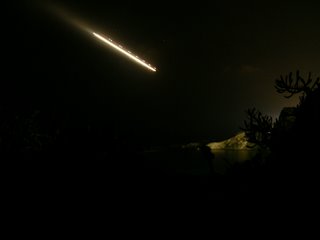
You lean back on the rocks in silence and stare up to watch the plane approach Beirut International. You watch it come in slowly along the coast, decending, searching through the night in front of it with its small nose light, dependent upon the lights miles ahead to guide it safely through the fog.



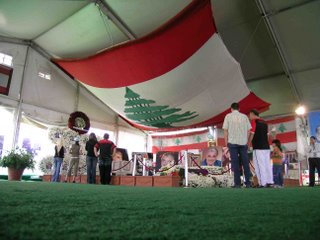




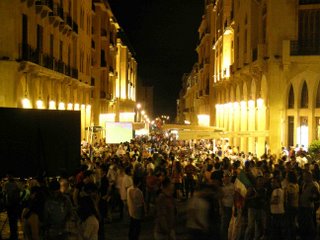



 Mona (to me, on the Corniche, by the sea): "She just sits in her room. She has been there for days. She is just crying...crying all the time. I tell her, 'you must eat you must do something' - she is going to go blind, I tell her."
Mona (to me, on the Corniche, by the sea): "She just sits in her room. She has been there for days. She is just crying...crying all the time. I tell her, 'you must eat you must do something' - she is going to go blind, I tell her."



